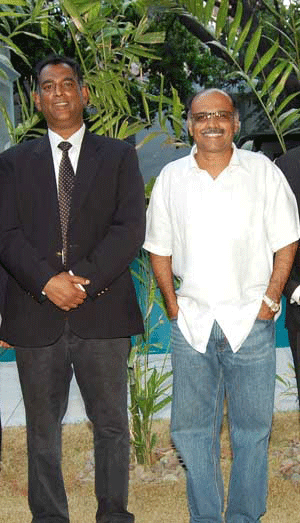
 Two
captains: (Left) Preetham Philip, Chief Executive of Quikjet Cargo,
and Captain G. R. Gopinath, during the heyday of Deccan 360. Two
captains: (Left) Preetham Philip, Chief Executive of Quikjet Cargo,
and Captain G. R. Gopinath, during the heyday of Deccan 360.
It is a second beginning—albeit
a small one—for the Bangalore-based Quikjet Cargo. Operating
with ATR freighters, the company has started almost four years after
it was formed in 2008. Between then and now, according to those conversant
with Quikjet, the company could not understand the market conditions
and the regulations. The delay in starting the services was because
of a number of reasons, the main being the slowing economy.
In between, Quikjet sought and received
five six-month extensions from the Directorate General of Civil Aviation
to keep its scheduled air transport services license alive.
What is important is the fact that Quikjet
has entered the domestic air cargo arena at a very interesting time:
apart from a big player like Blue Dart, the others who were in the
fray—Captain G. R. Gopinath’s Deccan 360 and Captain Mukut
Pathak’s ACE—are no longer in the air. What remains to
be seen is whether Quikjet will manage to keep its head in the clouds.
For starters, Quikjet will not look
out for funds. Preetham Philip, Chief Executive of Quikjet Cargo,
is a veteran in the aviation business, and is well aware of what he
is doing (he was COO Aviation at Deccan Cargo & Express Logistics
Private Limited and Deputy COO of Air Deccan, India’s first
low cost carrier). He can gauge the potential of air cargo. He says
that while there has been a growth in passenger airlines in India,
“air cargo has barely witnessed any activity.” The lack
of freighters in the country has pushed forwarders to opt for belly
space in passenger planes, which is not good “for time critical
shipments or movement of dangerous goods,” says Phillip.
Also, he has the advantage of being
funded by European cargo airline Farnair Switzerland AG, which has
a stake in the company. Among Quikjet’s investors is Tata Capital,
Infrastructure Leasing and Financial Services (ILFS), Infrastructure
Development Finance Company (IDFC), and AFL (FedEx Express completed
the acquisition of the logistics, distribution and express businesses
of AFL and its affiliate, Unifreight India, in the beginning of February
last year). Even with such strong financiers, Quikjet Cargo could
not start its services and sought five extensions of six months each
from the Directorate General of Civil Aviation (DGCA) to ensure that
its license remained valid.
Unlike others in the business who want
to fly abroad, Philip has no such desires. His target is the domestic
market. The COO says that Quikjet’s focus would be on “the
domestic market initially.” He goes on to point out that the
carrier does not have “plans to go to international destinations
at this time, but will be offering domestic coverage for global air
cargo companies.” The single ATR offering a payload of 8000
kg—later the fleet will be enhanced to three ATRs and four B737-400s—would
be “connecting Kolkata, Lucknow, and Patna (both capitals of
the states of Uttar Pradesh and Bihar, respectively).” Later,
Quikjet would “develop Hyderabad as our hub considering the
infrastructure,” he says, and continues, “We plan to begin
our operations with one aircraft and will gradually add aircraft to
the fleet to have a pan-India network.”
Untouched by Capt, Gopinath’s
business model that included air cargo and door-to-door services,
Quikjet’s Philip insists that his business will be on airline
connections. The company will pick up shipments from integrators and
deliver them to different destinations. According to Quikjet officials,
the company had been assured of sufficient tonnages from the integrators.
Charter and lease services will be available simultaneously with a
scheduled network, said Philip. The integrators and charters will
“assure cargo and we will assure them prompt delivery,”
he emphasized.
Tirthankar Ghosh
|




